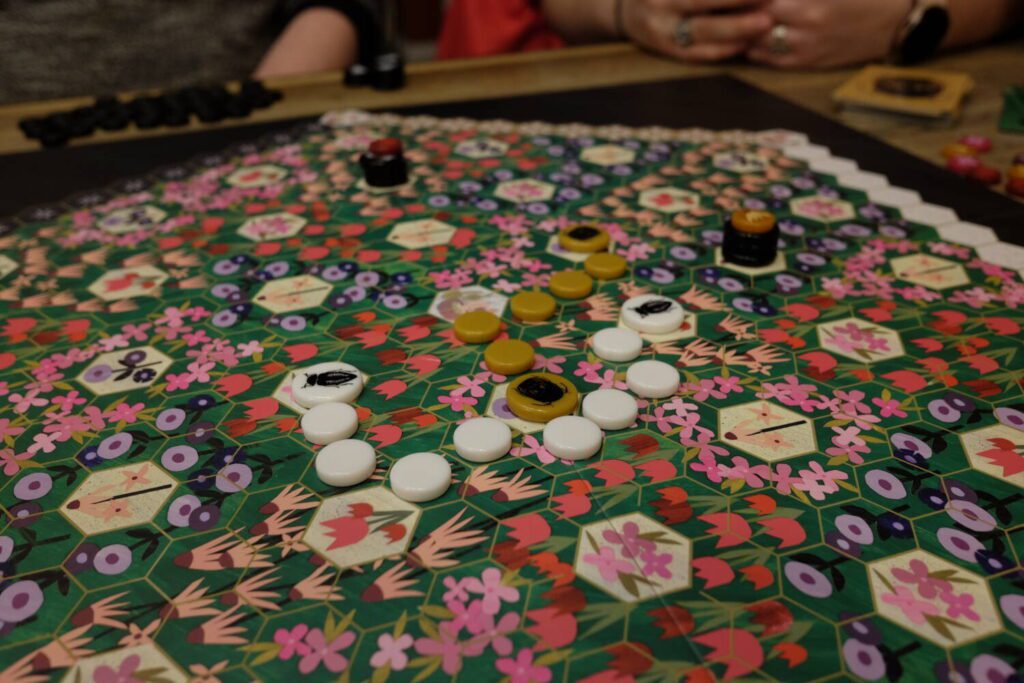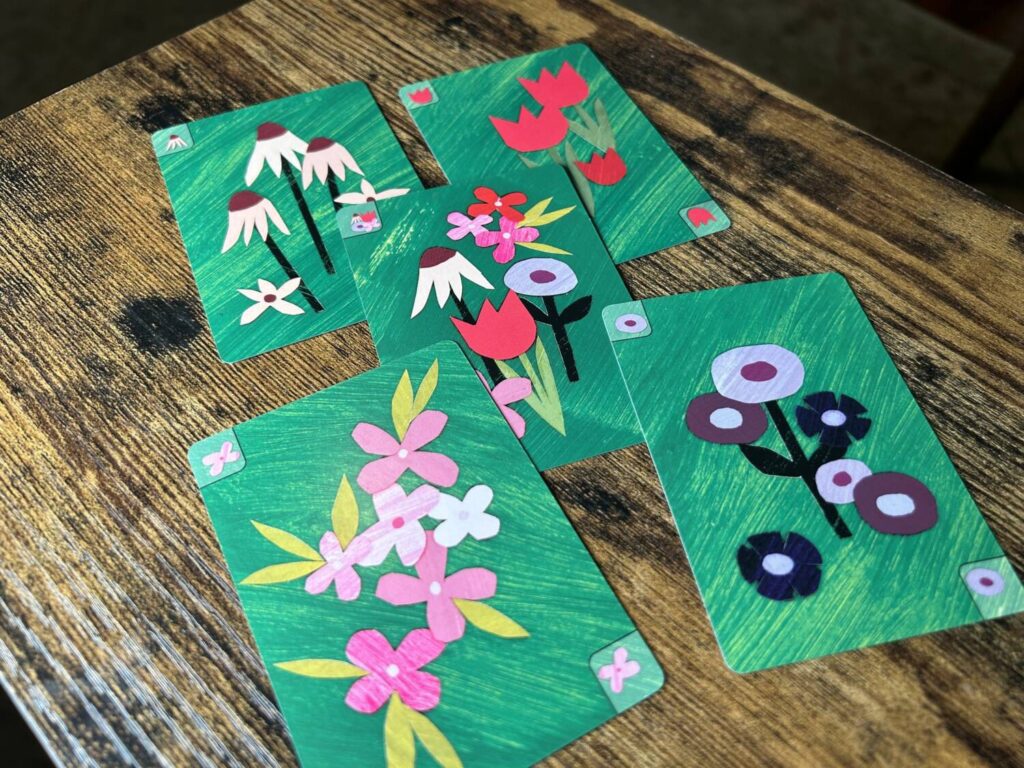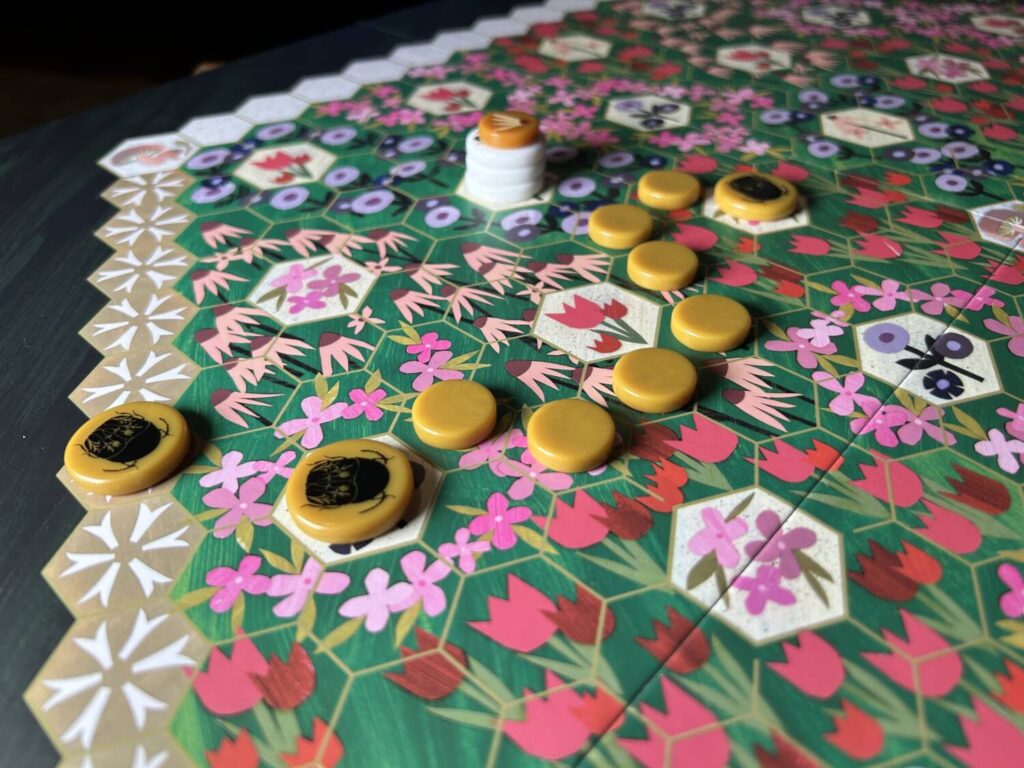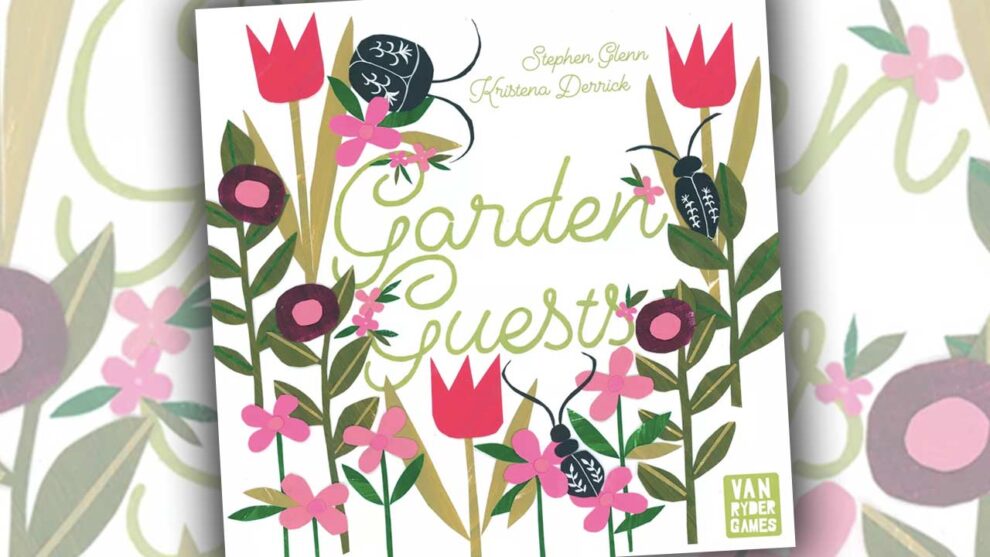Disclosure: Meeple Mountain received a free copy of this product in exchange for an honest, unbiased review. This review is not intended to be an endorsement.
I could be wrong about this, but I would tell you that I came of age at the tail end of the period when it was considered best to keep your plants as insect-free as possible. Even if we understood it scientifically, the culture hadn’t yet come around to the idea that plants need animals, and vice versa. It was a different time. Richard Powers hadn’t written The Overstory yet. How were we to know?

Gameplay
Players are divided into teams. The goal is to build colonies, and to connect those colonies via a path from one side of the board to the other. This is done with the cards from your team’s deck, each fo which shows one of the four flower types on the board. On your turn, you have a choice of four actions. You can draw cards, you can share cards with one of your teammates, you can build a Colony, or you can connect two Colonies already on the board.
Drawing and sharing are straightforward enough. Each team has two cards, each with one number on each side. 1 and 4 share a card, as do 2 and 3. To either draw or pass, you pick one of the two numbers that are currently face-up, then flip the corresponding card over. This gives a fun bit of texture to deciding how many cards to pass or draw. If you use a 4 now, you’ll need to contend with a 1 later.
Passing cards is important in Garden Guests. It’s the only way you are allowed to communicate with your teammate(s). This is my favorite part of the game, when it works out. If I pass you a lone card, maybe I’m telling you to build a colony on a particular space that matches that flower. Maybe I’m hoping that’s what you need to complete a path. It’s on you to figure that out. I enjoy that dynamic.

Building Colonies requires the cards in your hand. The hexagonal grid has larger spaces for Colonies, where players can build by discarding any number of cards that match the flower for that space. If you can build a Colony by discarding one card, why would you discard more? Well, nobody said your Colonies were safe. On their turn, any player on the opposing team can unseat your Colony by discarding more cards than you did. Now, it’s their Colony.
You also discard cards to build paths between any two of your Colonies. So long as you have the corresponding cards for all the spaces in between, you can connect two of your Colonies. At that point, those Colonies are safe, and cannot be replaced by your opponents.
Player Count
Garden Guests is advertised as being for 2-6 players. When a game allows for a wide range of player counts, different numbers typically emphasize different aspects of the design, both mechanically and socially. For some games, like Istanbul or Splendor, it doesn’t make a huge difference. The feel changes slightly, timing is more important, but you’re still playing the same game.
Garden Guests is not the same game at every player count. Not even close. It is three different—fundamentally different—games: the 2- and 3-player game, the 4- and 6-player game, and the 5-player game.
The 4- and 6-player game is Garden Guests as described on the box, and in the previous section of this review. The 2- and 3-player game is fine, with each player operating on their own, but the limited communication is what gives Garden Guests moments of magic. You don’t get that without teams. Moreover, when you play with individuals, it mostly comes down to luck. If you got the cards you needed, you can do the thing you want to do. If you didn’t get the cards you needed, you didn’t get them. The only thing mitigating luck in Garden Guests is the ability to pass cards—a great mechanism for doing that—and it doesn’t exist when you don’t have a teammate.
The 5-player game fundamentally doesn’t work. Rather than have two teams with imbalanced player counts, there are two teams and one lone wolf. It is my experience that the lone wolf, assuming basic competency, destroys the other teams. How couldn’t they? They’re working with perfect information about what cards their teammate has. They’re just about the only person at the table who can really plan. We called our 5-player game early, because the lead was insurmountable.

Almost There
I want to love Garden Guests. The pieces are all here. I love route-building, I love cooperative games with limited communication, and I absolutely adore the art style. I can’t quite get there. I like it at 4, but there’s always something that doesn’t work.
Most of the time, the leader becomes clear very quickly, and the other team(s) can’t ultimately do anything about it. The idea seems to be that you play for the middle, stake your lines, and then go, but the geometry is such that the initial exchanges pretty much determine the outcome. If one team shoots the moon and makes it, there’s no coming back from that.
In my six player game, one of the teams fell quickly into passing all of their cards to one player, effectively recreating the issues I described in the 5-player game. That’s not fun for two of the players, and it’s certainly not fun for the other team.
One of my friends pointed out that we weren’t booting one another’s Colonies much, which may be the issue, but the game didn’t steer us towards doing that. Booting the other team isn’t fun. It threatens to bog the whole game down. If the game isn’t steering you towards what’s fun, does it work? Maybe you’re supposed to lay down a bunch of Colonies at the beginning of the game, flooding the board with options, and then build routes out of those later? But that’s not fun. What’s fun is building a route. Again, if the game isn’t steering you towards what’s fun, does it work?
I wish it worked. I want to love this game. I absolutely adore the art from Kristena Derrick. It doesn’t look like any other game. In the process of writing this review, I texted my friend Jim, who shares my sentiment of wanting to love it, to say “I remain vexed by this game.” I don’t know what could be done differently to improve Garden Guests. The issue(s) may be as fundamental as the geometry of the board. Who knows. I could actually talk about this for hours, so thoroughly thrown off am I by my experience with this game.
Vexed, I tell you.












Crap. Another game I was really hoping would be worth getting. 🙁
Excellent review!